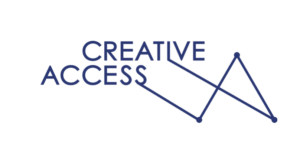Already a member? Sign in below
 Creative Access works to increase representation and inclusivity in the creative industries and here are our guidelines for making the advertising industry more accessible, representative and inclusive.
Creative Access works to increase representation and inclusivity in the creative industries and here are our guidelines for making the advertising industry more accessible, representative and inclusive.
People from working-class backgrounds are under-represented in many industries, however the Advertising Association’s All In Census found that, in advertising, they were outnumbered almost two to one by those with a privileged upbringing. The creative industries, specifically advertising, need to do more to represent society as a whole, not just one subset. At Creative Access, we recognise the barriers people from under-represented communities face when entering the creative economy, but there are ways your organisation can attract, support and retain employees from all different walks of life.
Paid Internships
The most fundamental way to improve diversity of social background in your organisation is to pay your employees a fair and living wage. The London Living Wage is now the standard for agencies and organisations based in the capital. This may seem obvious, but too often agencies rely on unpaid or low-paid interns. Most people cannot afford to work for free, so by taking on unpaid labour, you deny a whole host of people a way of gaining access into the industry and limit access to those whose families can afford to subsidise them.
In fact, our recent research shows that financial barriers, such as re-locating, living and commuting costs, have prevented a staggering 77% of our community working in advertising and PR from even applying to jobs. Anecdotally in this research, numerous people from low-income backgrounds explained that they would be unable to live if they took on an unpaid internship and even some paid internships as the salary is so low. Many also said they struggled to find an entry-level salary in the creative industries on which they could survive living in London.
Paying your employees a fair and living wage is not only a way of attracting a breadth of talent which might not usually be able to join your organisation, but shows potential employees that they are valued. In entry-level positions, this is key for gaining confidence and providing a helping hand into what can be an unknown world.
Longer and more stable contracts
Young people from working-class backgrounds cannot afford to make the jump into advertising unless they are offered job stability. Internships or contracts that last only 3 months do not offer this. Yes they provide experience but they make financial and living situations too precarious and people from lower income backgrounds cannot risk taking on a role with such little job security, especially without the promise of being offered something longer-term afterwards.
Value your employees’ time and work. Are there long-term internships, entry-level training positions, or mentoring opportunities that you can offer them to help them progress? How can you ensure that employees from working-class backgrounds progress into more senior levels? Are you able to provide support with re-locating, living or commuting costs such as the Career Development Bursary, Creative Access offers in partnership with McLaren Racing.
Diversify your recruitment
Analyse your data. Figure out which demographics are under-represented and why and develop specific initiatives or processes to tackle these in the long-term. Stop hiring by word of mouth, which excludes people who do not have networks within advertising. Instead recruit across a range of platforms.
Ensure your recruiter roster is fit for purpose. Do your recruitment partners have a strong enough network amongst under-represented groups? Are their own teams diverse and representative? Are they incentivised just to ‘close’ a role or to think creatively and look for talent via different networks and communities? And when you do advertise a role, make sure to state the salary. Transparency with contracts and payment is key for potential employees to gain a clear picture of the role.
Support
There are ways that you can ensure different social backgrounds feel comfortable and confident within your organisation. At Creative Access, we offer a wide-range of employer training that can benefit all staff, from senior to junior levels. We conduct training on unconscious bias, class and inclusive leadership with expert professionals, such as clinical psychologists, lawyers and diversity experts.
Being outnumbered in a work environment can be a very lonely experience. Employers must instil in their employees that their differences are not a point of contention, but a point of a celebration. Supporting your current staff helps retain them, showing potential employees that your organisation takes diversity seriously.
Across the advertising industry, not enough is being done to ensure that diversity in social backgrounds, ethnicity and disability is improved. We need to break down the barriers that make any industry difficult to enter, but advertising specifically will improve with a broader range of backgrounds, experiences and ideas. Diversity fuels creativity, and how can you speak to a diverse audience without an inclusive team?
You can find out more about Creative Access positive-action schemes, paid internships, diverse recruitment and training here.
Already a member? Sign in below
If your company is already a member, register your email address now to be able to access our exclusive member-only content.
If your company would like to become a member, please visit our Front Foot page for more details.
Enter your email address to receive a link to reset your password
Your password needs to be at least seven characters. Mixing upper and lower case, numbers and symbols like ! " ? $ % ^ & ) will make it stronger.
If your company is already a member, register your account now to be able to access our exclusive member-only content.